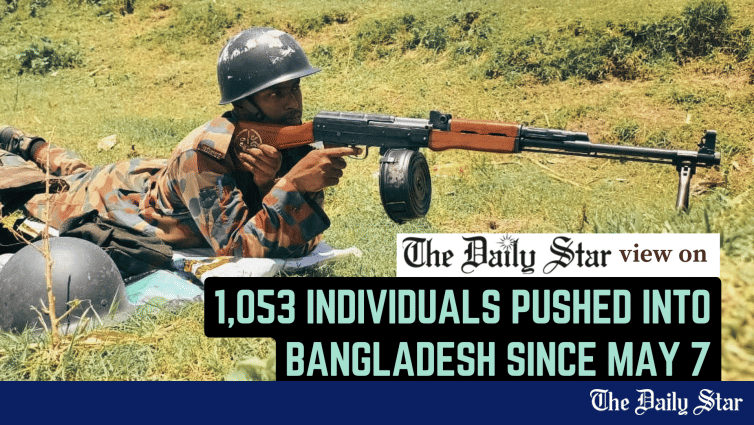Saif
Senior Member
- 13,782
- 7,411
- Origin

- Axis Group

- Copy to clipboard
- Thread starter
- #201

BGB foils BSF's push-in bid
Border Guard Bangladesh (BGB) has foiled an attempt to push in 13 Indian nationals through the border at Chawratari village of Durgapur Union under Aditmari upazila of Lalmonirhat district early Wednesday morning. According to sources, among the 13 people, six were women and one an infant. The in
BGB foils BSF's push-in bid
OUR CORRESPONDENT
Published :
May 29, 2025 09:33
Updated :
May 29, 2025 09:33

Border Guard Bangladesh (BGB) has foiled an attempt to push in 13 Indian nationals through the border at Chawratari village of Durgapur Union under Aditmari upazila of Lalmonirhat district early Wednesday morning.
According to sources, among the 13 people, six were women and one an
infant. The incident took place near the Main Pillar No. 924 and the sub-pillar 9(S) of Durgapur union.
Being informed, locals and BGB personnel rushed to the spot and foiled the attempt of push-in by the Indian Border Security Force (BSF). These 13 people were brought from Assam. They were later left stranded at the zero line of Durgapur border near the Main Pillar No. 924.
When contacted, Lt Colonel Mehedi Imam, commanding officer (CO) of 15 BGB Battalion, Lalmonirhat, said, "We have told BSF that they are not BD citizens as they have no valid papers of BD. It's very inhumane trying to push in people at dead of night."
There is an infant among the 13 people including women.
They said they were from Assam and they had residences there. They have valid voter ID cards and other valid papers also.
Their papers were snatched by the BSF.
BGB told BSF to show their valid paper against their claim of BD citizenship, he added.
OUR CORRESPONDENT
Published :
May 29, 2025 09:33
Updated :
May 29, 2025 09:33
Border Guard Bangladesh (BGB) has foiled an attempt to push in 13 Indian nationals through the border at Chawratari village of Durgapur Union under Aditmari upazila of Lalmonirhat district early Wednesday morning.
According to sources, among the 13 people, six were women and one an
infant. The incident took place near the Main Pillar No. 924 and the sub-pillar 9(S) of Durgapur union.
Being informed, locals and BGB personnel rushed to the spot and foiled the attempt of push-in by the Indian Border Security Force (BSF). These 13 people were brought from Assam. They were later left stranded at the zero line of Durgapur border near the Main Pillar No. 924.
When contacted, Lt Colonel Mehedi Imam, commanding officer (CO) of 15 BGB Battalion, Lalmonirhat, said, "We have told BSF that they are not BD citizens as they have no valid papers of BD. It's very inhumane trying to push in people at dead of night."
There is an infant among the 13 people including women.
They said they were from Assam and they had residences there. They have valid voter ID cards and other valid papers also.
Their papers were snatched by the BSF.
BGB told BSF to show their valid paper against their claim of BD citizenship, he added.













